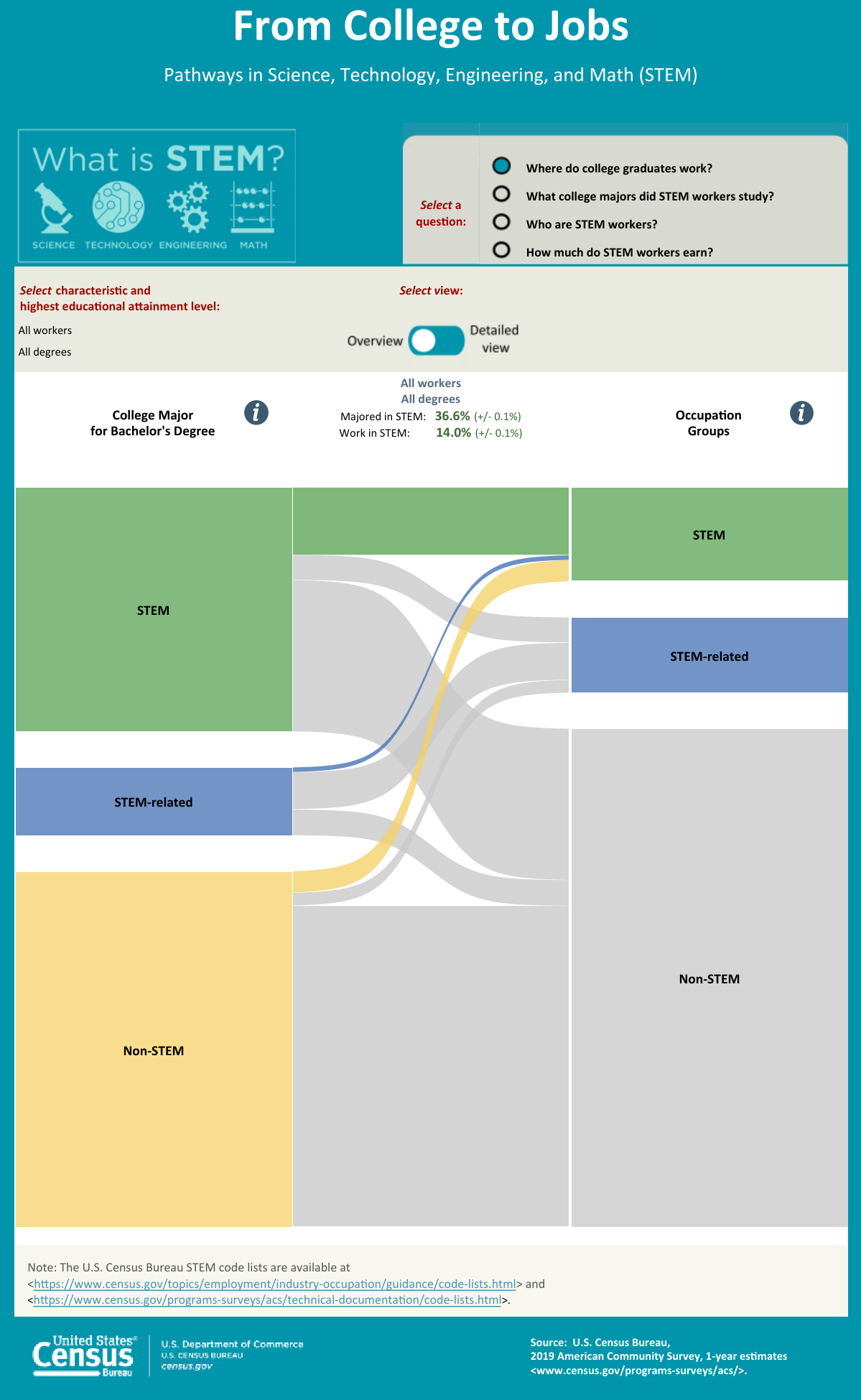Salaries and benefits for tech workers have been flat since 2008, amid massive corporate profits and huge stock gains, according to federal data revealed by the Center for Immigration Studies.
After inflation, “compensation grew at a rate of just 0.15 percent per year” from 2008 to 2023, the center reported on August 30, adding:
Furthermore, compensation for STEM [science, technology, engineering, and mathematics] workers was 7.1 percent lower in 2023 than in 2019 before the pandemic, with wages down 7.6 percent and benefits down 6.2 percent.
The flat pay was revealed in unpublished data provided by the federal Bureau of Labor Standards after a CIS request.
The data shows a slight pay increase during President Donald Trump’s term and a quick drop under President Joe Biden’s term.
The wealth not gained by STEM professionals mostly went to the owners and investors of the companies, said Steven Camarota, research director at CIS. “A lot of people who do benefit are corporate fat cats — and a lot of the losers are [university] class,” he told Breitbart News.
By subscribing, you agree to our terms of use & privacy policy. You will receive email marketing messages from Breitbart News Network to the email you provide. You may unsubscribe at any time.
Through the 2008 to 20023 period, the federal government has annually imported hundreds of thousands of foreign graduates via a wide variety of work-permit programs, such as the H-1B, OPT, and J-1 programs. Biden’s deputies are now accelerating the inflow — without any opposition by Kamala Harris — so helping many tech companies to fire American graduates and hire cheap and compliant visa workers.
Despite the government’s damage to U.S. professionals, GOP candidates do little to woo the one-quarter of voters who are college graduates. NBC News reported on September 4:
Harris receives robust support from college graduates, besting Trump by 26 points among this group (56% to 30%). Additionally, only 5% of college graduates say they won’t vote for president in November.
An August 29 Quinnipiac poll showed Harris with a 59 percent to 38 percent lead among white college graduates, even as more American professionals are being discarded in favor of mid-skill migrant workers.
However, the huge damage being done to Americans’ professional class is ignored by the establishment media, in part, because editors and reporters do not have the freedom to follow the money in migration politics.
The Claimed STEM Shortage
The flat pay and benefits are strong and clean evidence that the U.S. economy does not face a shortage of American STEM graduates, despite many claims by Fortune 500 employers, investor groups, and their lobbies, said Camarota:
The wage data is so powerful. It’s not [manipulated] bullshit. It’s not hypothetical. It’s not serving [the interests of] people who work in Human Resources. It’s just “What do you actually pay?” If you’re not actually paying a lot more, then you’re not desperate [to hore more] workers.
And if they say, “No, we’re desperate, but we just don’t pay any more,” then the answer is, “Too bad, you’re not really desperate for workers.”
Until “there is a massive increase in wages, you wouldn’t convince me [of a shortage],” he added.
“Wages are the gold standard” for evidence, she said, citing the rise of salaries for petroleum engineers. Their salaries, he said:
Went up massively ….from 2005 to 2015. You know why? [The development of] Fracking. They were getting very little pay for engineers [before 2005], but not long after 2005, they zoomed right to the top. The market did exactly what it was supposed to do.
Many American STEM graduates have lost careers as well as wages, Camarota said.
The CIS also collected 2020-22 data from the American Community Survey, which showed that the vast majority of American STEM graduates are not working in STEM jobs, even as companies continued to hire foreign graduates via the government’s work permit programs.
CIS reported:
The simplest way to induce more STEM degree holders to return to STEM fields is to allow wages to rise. Bringing in more foreign labor may slow wage growth and hinder this process. Keeping wages down may be in the interests of employers, but doing so is likely to create a self-fulfilling prophecy that there are no [willing] Americans to do such [immigrant-dominated] jobs.
Other experts have shown there is no shortage of U.S. STEM graduates, and that foreign graduates reduce the productivity of U.S. companies.

Source: Census.gov
Many U.S. politicians and lobbies insist that the U.S. economy needs even more imported graduates, despite the solid evidence that American STEM graduates are losing careers and wealth amid the mass immigration of lesser-skilled foreign graduates, In 2017, Breitbart News reported:
“I’m working at one of the Home Depot [hardware store] … there’s a lot of people in my position,” said Les, a former New York City technology worker for Disney, Pearson publishing, and other U.S. companies. He was pushed out of the business when companies outsourced their U.S. workplaces to Indian companies, many of which need U.S-based H-1B workers to link their U.S. clients to outsourcing offices in India. Les has a 13-year-old teenager to raise, and would return to the sector if he got a job offer, he said.
“About one-third of tech employees in Silicon Valley are of Indian origin,” the India-based Economic Times wrote on August 10.
President Joe Biden’s border chief, Alejandro Mayorkas, is dramatically expanding the inflow of white-collar visa workers by loosening the rules for entry and hiring.
Similarly, Rep. Tony Gonzalez (R-TX) recently introduced legislation to simultaneously curb illegal migration and expand the inflow of visa workers for Americans’ white-collar jobs and blue-collar jobs. He told CBS News on September 1:
If we want to win the space race, we’re going to need engineers from all over the world. If we’re going to grow our economy, we’re going to need the hospitality industry, construction workers, and other areas. … deporting people that aren’t [legal] here, and double down on legal work visas, people doing it the right way.
Gonzalez is strongly backed by pro-migration business donors and their funding helps him keep a seat on the House’s Committee on Homeland Security.
On the other side of the aisle, retiring Rep. Dan Kildee (D-MI) told FedNet TV in August that Americans depend on visa workers: “There is a need for us to deal with temporary visas — it’s in almost every sector of our economy, whether it’s agriculture, manufacturing … tourism.”
A new Pentagon-funded report by the National Academies of Science, Engineering, and Medicine insists the government should invite in many more immigrants — including mid-skilled and skilled college graduates — with minimal concern about national security or the impact on American graduates’ opportunities, incomes, and productivity.
It recommended:
The legislative branch should create easily navigable pathways to permanent residency and citizenship for qualified foreign-born STEM talent. … Congress should then authorize additional Green Card numbers for qualified foreign-born experts … The corresponding legislation should create a new category for permanent residents and should not carry any per-country caps or be subject to existing numerical limitations. Explicit eligibility for international STEM graduates of U.S. institutions should be included.
The NAS panel was stacked with business-backed migration advocates, including Amy M. Nice from the Institute for Progress, as well as U.S. and foreign-born university managers who use fee-paying foreign students to provide cheap, hard-working, and skilled labor to their peers’ research labs.
“The report is terribly one-sided … It is striking that some of the best research [on migration], recent research, on this is explicitly not included,” said Camarota, whose recommendations were sidelined by the panel.
The NAS report also ignored the vast scale of corruption, abuse, and discrimination in some of the visa programs, and the continuing layoffs of Americans.
The NAS report, said Camarota, ‘is absurd on its face and should never be taken seriously … I’m willing to say things like that because if you don’t find consistent wage increases in the data, you cannot seriously argue that there is a labor shortage.”



COMMENTS
Please let us know if you're having issues with commenting.